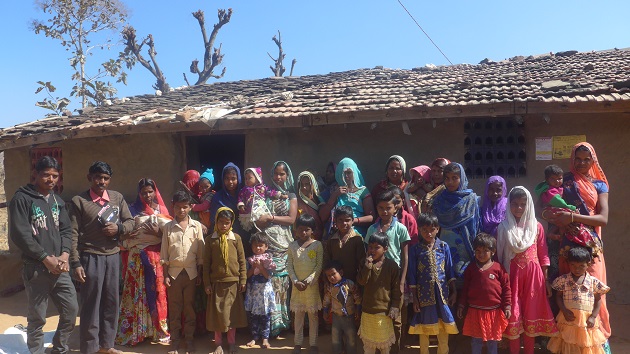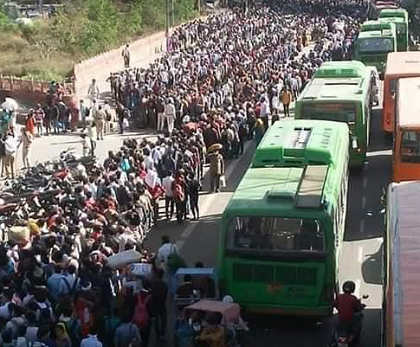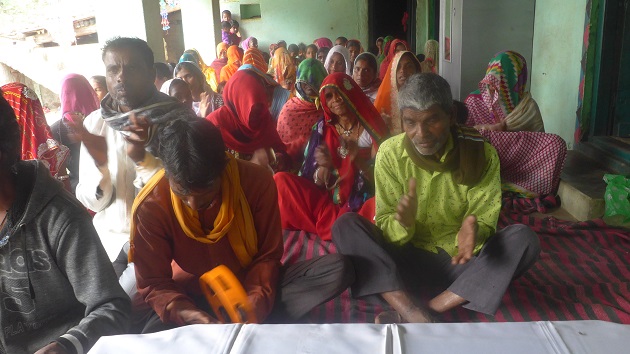Millions face a ‘double crisis’ as the Covid-19 epidemic grows. “Migrant workers are walking hundreds of kilometres desperated to reach their home villages”, says an evangelical pastor. “Thousands of Christian doctors, nurses and paramedics are serving in the frontline”.
 Members of a Christian community in a rural area of India. / Evangelical Focus, sources.
Members of a Christian community in a rural area of India. / Evangelical Focus, sources.
The Covid-19 crisis is only starting to impact India, the second most populated country in the world with over 1.3 billion citizens.
The gigantic nation, with over twice as much people than the whole European Union, is facing a “double crisis” after lockdown was announced.
Seven in ten people have suddenly seen their daily income severely reduced, and mass migrations to rural areas will only help to spread the virus. The health care system will not be capable to absorb the number of infected people, and the members of the lowest caste are expected to suffer the biggest consequences.
A pastor with long experience leading a network of Pentecostal churches in India, analysed the challenges for both general society and the Christian church commmunities in answers to Evangelical Focus.
 An image of large aglomerations of migrants trying to leave to their home towns, March 2020. / Evangelical Focus sources
An image of large aglomerations of migrants trying to leave to their home towns, March 2020. / Evangelical Focus sourcesQuestion. How will the lockdown ordered by the authorities change the day to day of the country?
Answer. The government ordered a lockdown of India’s 1.3 billion citizens to fight the spread of coronavirus, urging people to distance themselves socially and work from home. As of today [31 March], we have 1,637 confirmed cases of coronavirus and 37 deaths. What worries us is that the number of infections could be a substantial underestimate because the testing rates in the country are among the lowest in the world.
Although the government maintains that there is no community spread, there are signs of a cluster spread in Delhi were about 267 members where tested positive from within a Muslim congregation of 2,000 who had gathered for a meeting. Ten who attended this congregation died while many in the group travelled to different states of India and tested positive as well. It looks like things are getting out of control.
The government has taken measures like the travel ban, the closure of the international and state borders, with a closedown and curfews for 21 days ending on April 14. Apart from the essential services and commodities, everything is put under lockdown. This has created unprecedented situations in the country.
Q. Are there special groups of people who are expected to suffer most? How has such a crisis a different impact in India as compared with Western countries?
A. The impact of the closedown is very much different from western countries. There is a double crisis in the country – more deaths due to starvation than Covid-19 are expected.
Firstly, the medical unpreparedness for the crisis is evident as days unfold. The inadequate medical infrastructure facility and lack of medical personnel to brace the catastrophe of contagion is creating panic. Indian’s testing capability is low, as Covid-19 cases continue to rise, the country is also facing a shortage of equipment needed to support the medical staff. India has 0.7 hospital beds for every 100,000 people. Ventilators are in short supply.
Secondly, the most affected people in India are the informal sector, which includes taxi and auto drivers, street vendors, factory workers, migrant labourers and the rural communities. 65 to 70% of India’s economy is unorganised. More than the medical emergency people fear death through starvation.
What is worrying is the huge migration that has started across the country despite lockdown. The government’s hasty announcement of the lockdown left these hundreds of millions of workers less than four hours to prepare. This has triggered a massive exodus of migrant labourers and wage workers from cities back to the rural villages. Many face hunger and starvation in the absence of daily wages that have been disrupted. These migrant workers are walking hundreds of kilometres or crammed in a truck in their desperation to reach their home villages.
With the closedown and curfew police brutality on the streets, beating, humiliating, and even allegedly murdering people who step out to get essentials. Social distancing is almost impossible in the slums at Mumbai, Delhi and Kolkatta, people are cramped into single rooms.
Those migrant workers who returned from the cities were asked not to come to their village. There are reports of harassment to people from Northeast India, in Chennai, Pune and Hyderabad, due to their ethnic background.
420.png) A Christian gathering in a region of India. / Evangelical Focus, sources
A Christian gathering in a region of India. / Evangelical Focus, sourcesQ. How has the life of Christian churches been affected?
A. Both pastors and believers are coming to the realisation of the new way of dealing with spirituality.
For pastors, it is more of a challenge. Most of the Indian churches, except the more technologically advanced churches in the Metro cities, are not used to online connectivity. The church is now increasingly turning to do worship online. As a result, there is a rush to upload amateur videos that lack content and quality.
Online platforms are helping people to connect in fellowship. Apart from online worship, prayer groups, etc., the church is trying to be creative in how to spend time together.
The regular gatherings for prayers as congregations and weekly home gatherings is what keeps churches growing in India, especially in the rural regions. Visitors would regularly come to a church gathering for prayer. This is being affected, although pastors try to call people by phone, the ‘touch’ and the ‘healing’ prayers during regular services are missed.
Church finances are going to be affected, especially as unemployment is on the increase. Pastors in rural communities will be affected most.
Q. How can Christians serve others and make a difference as the Covid-19 crisis spreads?
A. The evangelical Christians (as well as Catholics) are preparing to face the challenges. With the closedown, the regular Sunday gatherings have been affected.
Christians have started to respond to the crisis. The church and its institutions through its effective network of education, healthcare, and other non-profit organisations in India are quietly going about helping the poor, marginalised and the most affected by providing food, medical and shelter support.
The Christian Coalition for Health in India (CHAI - including Christian Medical Association of India and Emmanuel Hospitals) expressed their willingness and offered their resources to collaborate with the government of India to fight the pandemic.
CHAI offered the government all facilities in Christian hospitals across India for coronavirus treatments. The CCHI has over 1,000 hospitals and more than 60,000 beds across the country. There are thousands of Christian doctors, nurses and paramedics who are already serving in the frontline. The church-run hospitals are turning a part of their wings into dedicated quarantine blocks.
Further, education institutions are providing support in various ways. Shelter homes are offering food and a place for the poor to stay.
 Members of a Christian community in a region of India. / Evangelical Focus, sources
Members of a Christian community in a region of India. / Evangelical Focus, sourcesQ. In terms of religious freedom, could the lockdown threaten freedom of worship or other human rights?
A. There have been incidents in which the police arrested pastors who did not take the closedown seriously.
But what I fear about the most has to do with the benefits, financial packages, and helps the government has promised to the poor, that these will not reach our believers. This has been an ongoing challenge for most of the believers who come from scheduled castes and tribal communities. The local governmental agencies make discriminations to those who have newly found faith in Jesus Christ.

Las opiniones vertidas por nuestros colaboradores se realizan a nivel personal, pudiendo coincidir o no con la postura de la dirección de Protestante Digital.
Si quieres comentar o